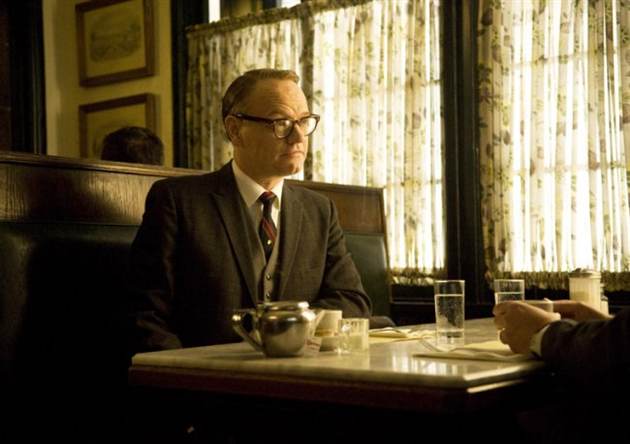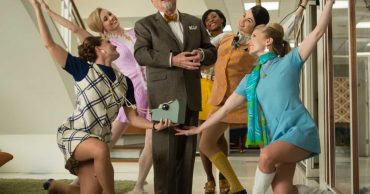Mad Men: ‘Far Away Places’— An Expert Opinion
Far away places with strange sounding names
Far away over the sea
Those far away places with the strange sounding names are
Calling
Calling me
Written by Joan Whitney and Alex Kramer
Viewpoint one:
After the important developments for main characters that we’ve seen in previous episodes this year, and for Pete Campbell in particular from ‘Signal 30’, it’s hard to imagine a less ‘important’episode than ‘Far Away Places’. There is so little ‘going on’that the whole thing plays a little like the science fiction/Holocaust survivor story Ginsberg tells Peggy. Outside of Roger leaving his miserable marriage, very little of import occurs.
Which is fine–an episode spent watching how our favourite flawed characters take a road trip, take an LSD trip, or take a trip to a screening of Born Free that includes smoking a joint and offering an impromptu hand job to a stranger, sounds like good fun. If Steve Martin can write a short novel like Shopgirl and introduce us to disparate characters just to, in his own words (poorly quoted from my memory that is), ‘see how differently they eat dinner’, then why can’t we all catch our dramaturgical breath? Wheel-spinning episodes that stand apart from ‘I’m late for my period’or ‘I’m living under an assumed identity’type stories allow us to catch our breath and watch how these people conduct themselves in a hundred quotidian tasks we all do every day. If we can’t identify with Peggy having a pissy little argument while she gets dressed in the morning, why the hell are we watching the show?
All well and good. ‘Far Away Places’, however, adopts a storytelling trope that reeks of concept and is often–but not always–a sign of reaching at straws. Conan O’Brien made a good point about concept while (rightfully) fawning over an SCTV cast reunion at the Aspen Comedy Festival: it kills comedy. I would say that concept in a serialized drama can have similarly fatal effects. In such a setting, it can at least betray a shark-jumping tendency usually reserved for dramatic engines on inspirational fumes.
It is important to state that O’Brien made his point by heralding SCTV as an exception that proved the rule. In the case of Mad Men and ‘Far Away Places’, the overlapping story of multiple characters that jump off from the same spot in time feels more literary than desperate, and in this light feels less like a distressing musical episode (OK, it worked on Buffy, but let’s not sully the memory by doing exactly the same thing–and I am looking at you, Fringe). But in the grand scheme of the series canon, and certainly compared to recent episodes, ‘Far Away Places’plays like an artistic blip.
Viewpoint two:
The casual brutality of romantic relationships is well captured in this scattershot storytelling approach. Whether it is the sniping between Peggy and Abe as she gets ready for a fraught day at work, the suffocating elevator exchanges that reveal the undercurrents of dreadful discontent between Roger and Jane, or the actual brutality of Don kicking in the apartment door to chase Megan down–Weiner has the pitfalls of married life down pat. Of course it would be great to see a happy marriage in the Mad Men universe, but what fun is that for such a psychologically attuned drama (or any drama for that matter)? Nobody in the show could be confused with ‘well adjusted’, and even Don’s ‘love leave’is marked by a hidden and frantic desire to be loved that almost continually backfires (I swear–if he didn’t look so much like Jon Hamm, Draper would be the biggest sad sack on TV right now).
Part of this legendary attention to detail, both historic and psychological, leads to the LSD dropping scene that rolls out slowly, entertains with army choruses singing out of vodka bottles and cigarettes drained in one breath, but still leads to a sorrowful end with both Roger and Jane admitting to profound unhappiness in their union. Nothing good comes without a cost, whether it’s a highball glass of booze, a blotter of lysergic acid diethylamide or marriage to a beautiful young woman/successful older man.
In the end, an episode structured on this sort of loopback feed threatens to bore by covering the same dramatic ground, but in the hands of a master like Weiner reveals and enlightens.
I can only hope that a West Side Story-inspired musical episode is not in the offing.
Viewpoint three:
Where the hell is Sal? American Tobacco is out of the way, and more importantly, Lee Garner Jr., so where is our second favourite closet case of the show (Draper being number one)? Now that Sterling Cooper Draper Pryce is getting back on its feet, TV commercials should become more of a factor and, one hopes, signal the return of Sal as a director. Sure I want to see if he’s still in the closet, our happily out in the swinging sixties–more importantly, I’d like to see how he wears an ascot and a Nehru jacket.
Like what you’ve read? Sure you did! Jump over to Amazon to get my book Kings of Madison Avenue: The Unofficial Guide to Mad Men
And you can always find me at jessemclean.ca or on twitter @kungfugripe
 Follow Us
Follow Us






I thought it was a great episode that finally made don face up to the lies of his marriage and realise that he is not that much different than when he was with Betty.
I’m also really glad to see a return to form for Roger, at episode end he felt like classic Roger.
Peggy’s story was great in helping reveal the backstory of Ginsberg, but I think deep down Ginsberg reminded Peggy of the child she gave up for adoption.